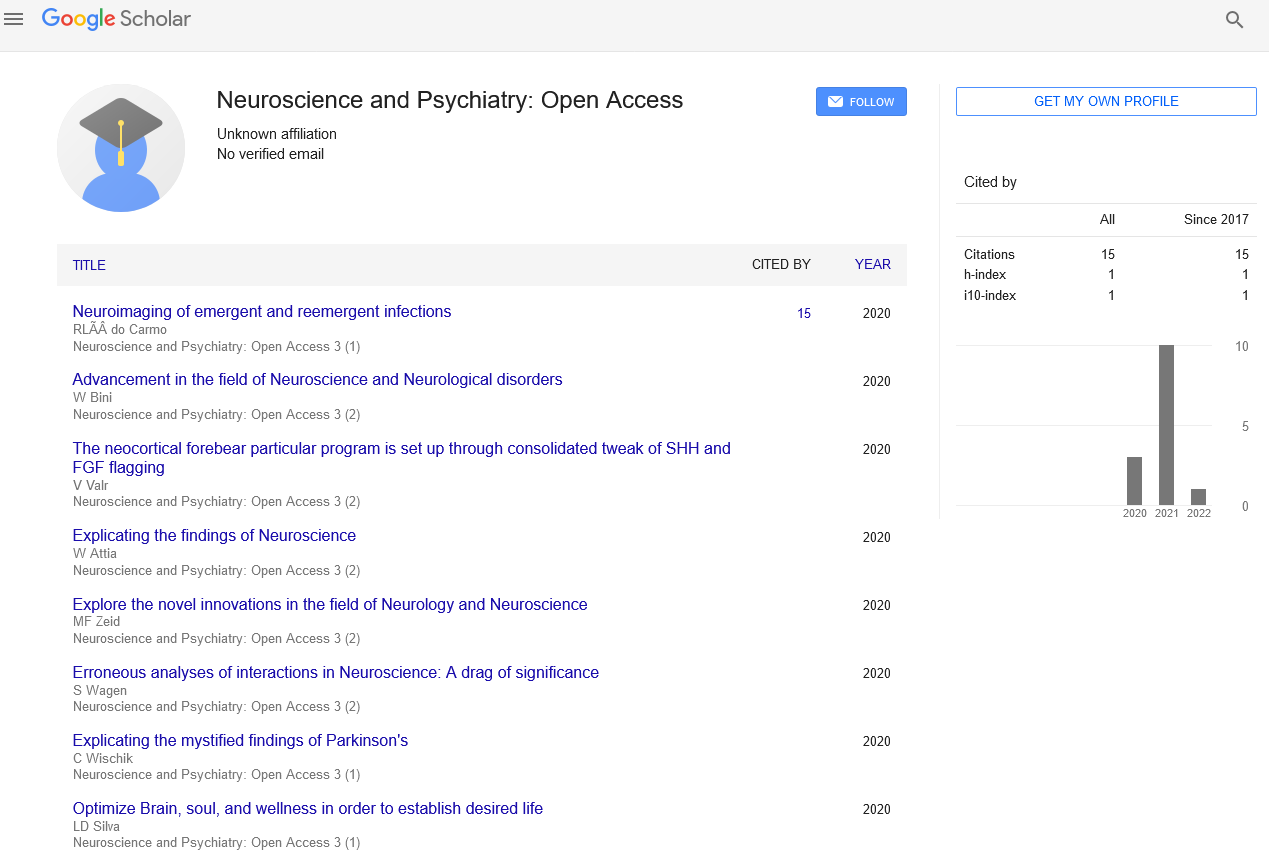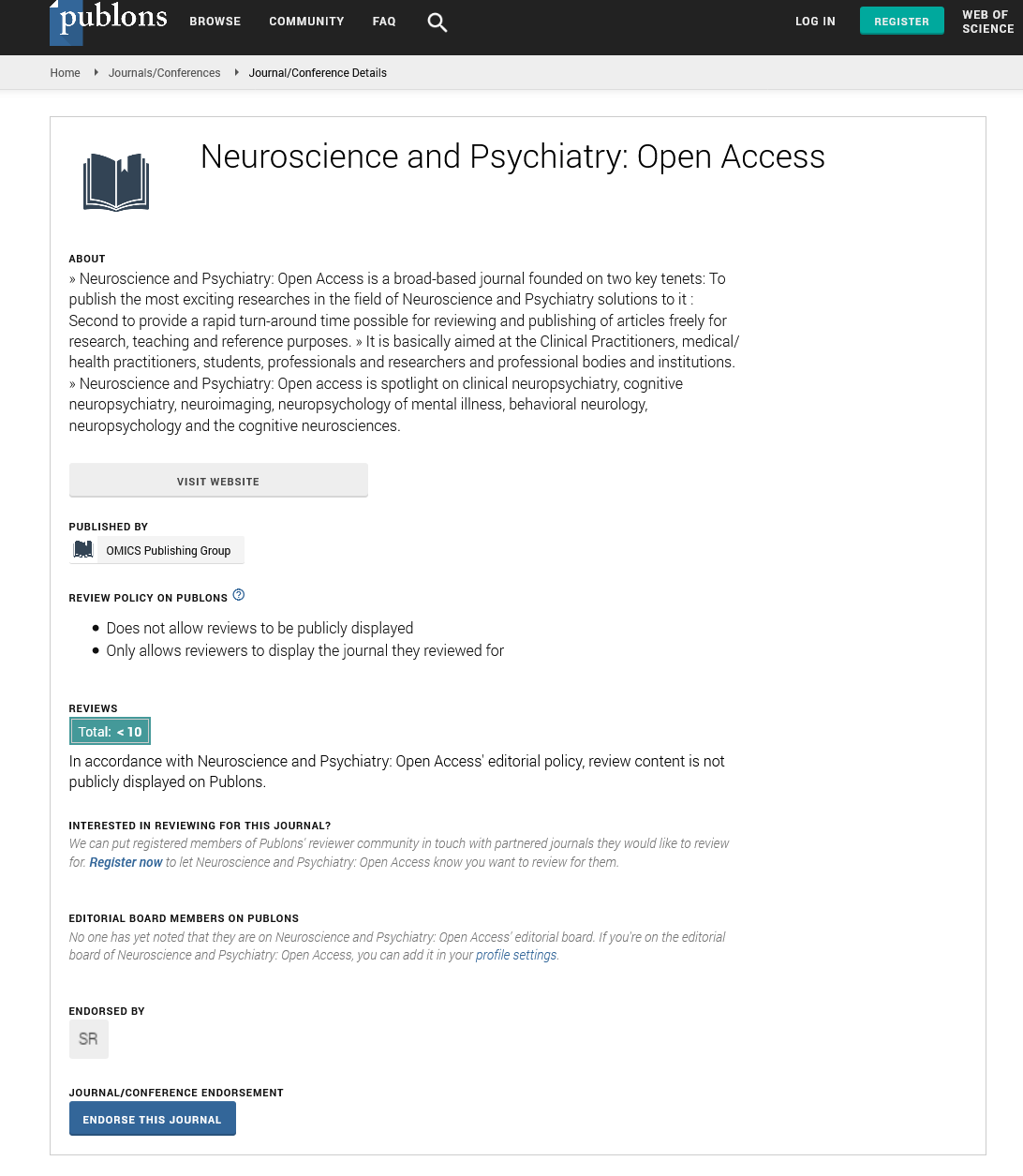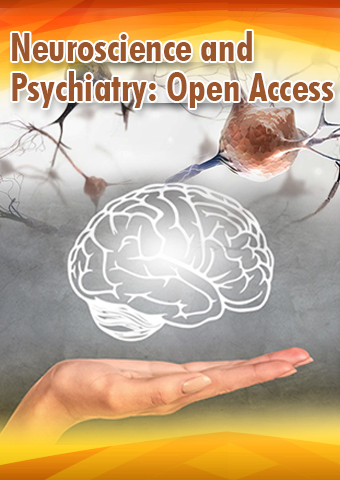Perspective - Neuroscience and Psychiatry: Open Access (2024) Volume 7, Issue 3
Bridging Cultures and Minds: Exploring the Realm of Cross-Cultural Psychiatry
- Corresponding Author:
- Jonathan Leung
Department of Psychiatry and Behavioral Sciences, The Johns Hopkins Medical Institutions, Baltimore, USA
E-mail: leung.jona56@mayo.edu
Received: 16-04-2024, Manuscript No. NPOA-24-128821; Editor assigned: 19-04-2024, PreQC No. NPOA-24-128821 (PQ); Reviewed: 03-05-2024, QC No. NPOA-24-128821; Revised: 13-05-2024, Manuscript No. NPOA-24-128821 (R); Published: 20-05-2024, DOI: 10.47532/npoa.2024.7(3).202-204
Introduction
Cross-cultural psychiatry is a dynamic and evolving field that examines the intersection of culture, ethnicity, and mental health. With globalization, migration, and cultural diversity shaping contemporary societies, understanding the cultural contexts of mental illness and treatment is essential for providing culturally competent and effective psychiatric care. In this article, we delve into the principles, practices, and challenges of cross-cultural psychiatry, exploring how cultural factors influence the expression, diagnosis, and treatment of mental health disorders.
Description
Foundations of cross-cultural psychiatry
Cross-cultural psychiatry is grounded in principles that recognize the cultural diversity of human experiences and the impact of culture on mental health. Key foundational concepts include:
• Cultural relativism: Cultural relativism posits that mental health and illness are shaped
by cultural norms, beliefs, values, and social contexts. What may be considered normal or
abnormal behavior in one culture may differ from another, highlighting the importance
of understanding cultural norms and values when assessing and diagnosing mental health
disorders. Cultural relativism challenges ethnocentric assumptions and encourages clinicians
to consider cultural factors in their evaluations and treatment approaches.
• Cultural competence: Cultural competence refers to the ability of mental health professionals
to effectively engage, assess, and treat individuals from diverse cultural backgrounds. Culturally
competent care involves recognizing and respecting cultural differences, addressing language
barriers, understanding the impact of cultural trauma and discrimination, and adapting
interventions to meet the cultural needs and preferences of clients. Culturally competent
clinicians engage in ongoing self-reflection, education, and training to enhance their cultural
awareness and responsiveness.
• Cultural formulation: The cultural formulation model, developed by the American
Psychiatric Association (APA), provides a framework for systematically assessing cultural
factors that may influence the expression and management of mental health disorders.
The Cultural Formulation Interview (CFI) guides clinicians in exploring cultural identity,
explanatory models of illness, cultural factors affecting diagnosis and treatment, cultural
stressors and supports, and cultural dynamics in the therapeutic relationship. Cultural
formulation enhances diagnostic accuracy, treatment planning, and rapport-building with
culturally diverse clients.
• Cultural syndromes: Cultural syndromes are patterns of symptoms, behaviors, and
experiences that are recognized within specific cultural groups and may not align with
Western diagnostic categories. Examples of cultural syndromes include ataques de nervios
in Hispanic/Latino populations, koro in Asian populations, susto in Latin American
populations, and zar in African and Middle Eastern populations. Cultural syndromes reflect culturally bound expressions of distress,
identity, and social roles and may require
culturally sensitive approaches to assessment
and intervention.
Practices and applications of cross-cultural psychiatry
Cross-cultural psychiatry encompasses a range of practices and applications aimed at promoting culturally responsive mental health care. Key practices include:
• Culturally informed assessment: Culturally
informed assessment involves gathering
information about a client’s cultural
background, beliefs, values, and social
context to inform diagnosis and treatment
planning. Culturally competent clinicians
use culturally sensitive interviewing
techniques, interpreter services, and
validated assessment tools to elicit cultural
information and understand the cultural
meanings of symptoms. Culturally informed
assessment enhances diagnostic accuracy,
reduces misdiagnosis, and promotes trust
and rapport between clinicians and clients.
• Ehnopsychopharmacology: Ethnopsychopharmacology explores
how cultural factors influence
the pharmacological response to
psychotropic medications and treatment
outcomes. Genetic, pharmacokinetic,
pharmacodynamic, and psychosocial factors
may interact with cultural variables, such
as dietary practices, medication beliefs,
religious rituals, and stigma, to affect
medication adherence, efficacy, and adverse
effects. Ethnopsychopharmacology informs
medication selection, dosing, monitoring,
and psychoeducation to optimize treatment
outcomes and minimize cultural barriers to
care.
• Culturally adapted interventions: Culturally
adapted interventions are psychotherapeutic
approaches that integrate cultural values,
beliefs, and practices into evidence-based
treatments for mental health disorders.
Culturally adapted interventions may
include Cognitive-Behavioral Therapy
(CBT), Dialectical Behavior Therapy
(DBT), Interpersonal Therapy (IPT), and
mindfulness-based interventions tailored
to the cultural context and preferences of
clients. Culturally adapted interventions
promote engagement, retention, and
effectiveness of treatment among culturally
diverse populations and reduce disparities
in mental health care access and outcomes.
• Collaborative care models: Collaborative
care models integrate mental health
services with primary care, community
resources, and cultural supports to address
the complex needs of culturally diverse
populations. Collaborative care teams
include psychiatrists, primary care providers,
psychologists, social workers, interpreters,
community health workers, and cultural
brokers who work together to deliver
culturally responsive care. Collaborative
care models enhance access to mental health
services, improve treatment engagement,
and reduce disparities in mental health
outcomes for underserved and minority
populations.
Challenges and considerations in cross-cultural psychiatry
Cross-cultural psychiatry faces several challenges and considerations in providing culturally competent and effective mental health care. Key challenges include:
• Cultural competence training: Limited
cultural competence training and education
among mental health professionals may
hinder their ability to effectively engage,
assess, and treat culturally diverse clients.
Clinicians may lack awareness of their
own cultural biases, assumptions, and
blind spots, leading to miscommunication,
misdiagnosis, and inadequate treatment.
Enhanced cultural competence training
and ongoing professional development
are needed to address these challenges and
promote culturally responsive care.
• Language and communication: Language
barriers and communication difficulties
pose challenges in conducting culturally
competent assessments and delivering
mental health services to individuals with
limited English proficiency or non-western
cultural backgrounds. Access to qualified
interpreters, bilingual clinicians, and
culturally competent communication tools
is essential for overcoming language barriers
and ensuring accurate assessment and
treatment of mental health disorders.
• Stigma and discrimination: Stigma and
discrimination related to mental illness,
ethnicity, race, immigration status, and cultural identity may deter individuals from
seeking mental health care and accessing
culturally competent services. Cultural
beliefs, religious attitudes, and social norms
surrounding mental illness may contribute
to stigma and influence help-seeking
behaviors within cultural communities.
Addressing stigma and discrimination
requires culturally tailored anti-stigma
campaigns, community outreach, and
advocacy efforts to promote mental health
awareness and acceptance.
• Ethical and legal considerations: Ethical and
legal considerations arise in cross-cultural
psychiatry regarding issues such as informed
consent, confidentiality, competence, and
cultural competence. Clinicians must
navigate complex ethical dilemmas when
working with culturally diverse clients,
including respecting cultural differences,
promoting autonomy, and safeguarding
the rights and well-being of clients. Ethical
guidelines, cultural competence standards,
and professional codes of conduct provide
guidance for ethical practice in cross-cultural psychiatry.
Conclusion
Cross-cultural psychiatry plays a critical role in addressing the cultural dimensions of mental health and promoting culturally responsive care for diverse populations. By recognizing the influence of culture on mental health beliefs, behaviors, and outcomes, cross-cultural psychiatry enhances diagnostic accuracy, treatment effectiveness, and patient satisfaction. As the field continues to evolve, embracing cultural competence, collaboration, and innovation, it holds promise for reducing mental health disparities, improving access to care, and fostering culturally inclusive approaches to mental health promotion and intervention. With a commitment to cultural humility, empathy, and respect for diversity, cross-cultural psychiatry remains essential for bridging cultures and minds in the pursuit of mental health equity and social justice.


